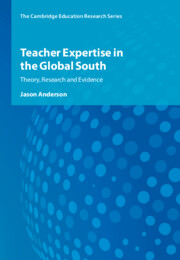Book contents
- Teacher Expertise in the Global South
- Teacher Expertise in the Global South
- Copyright page
- Contents
- Figures
- Tables
- Acknowledgements
- Abbreviations
- 1 Introduction
- 2 The Construct of Teacher Expertise
- 3 The Expert Teacher Prototype
- 4 Effective Teaching in Low-Income Contexts
- 5 Researching Teacher Expertise in the Global South
- 6 A Portrait of Teacher Expertise
- 7 Exploring the Quintain
- 8 Diversity in Expertise
- 9 Teacher Expertise in the Global South
- 10 Updating the Expert Teacher Prototype
- 11 Valuing and Building on Southern Expertise
- 12 Concluding Reflections
- References
- Index
2 - The Construct of Teacher Expertise
Published online by Cambridge University Press: 18 May 2023
- Teacher Expertise in the Global South
- Teacher Expertise in the Global South
- Copyright page
- Contents
- Figures
- Tables
- Acknowledgements
- Abbreviations
- 1 Introduction
- 2 The Construct of Teacher Expertise
- 3 The Expert Teacher Prototype
- 4 Effective Teaching in Low-Income Contexts
- 5 Researching Teacher Expertise in the Global South
- 6 A Portrait of Teacher Expertise
- 7 Exploring the Quintain
- 8 Diversity in Expertise
- 9 Teacher Expertise in the Global South
- 10 Updating the Expert Teacher Prototype
- 11 Valuing and Building on Southern Expertise
- 12 Concluding Reflections
- References
- Index
Summary
This chapter looks at the construct of expertise in detail, investigating how and why it is simultaneously useful yet problematic, arguing that it is, nevertheless, the most appropriate measure of quality among teachers. It begins by looking at prior definitions of expertise in education, identifying two key tendencies within these definitions – tendencies towards norm-referencing and criterion-referencing. Norm-referenced expertise is further subdivided into product-referenced (expertise as outcome) and community-referenced (expertise as role) expertise, and criterion-referenced expertise is subdivided into competence-referenced (expertise as attribute) and process-referenced (expertise as process/practice) expertise. The chapter then goes on to investigate two often-perceived proxies of teacher quality in educational research, teacher effectiveness and teacher experience. It provides extensive evidence to support the assertions that teacher effectiveness is too narrow a construct to encapsulate all that we value in teacher quality and that teacher experience is too wide, and does not correlate consistently enough with quality. It argues that there is a somewhat ‘fuzzy’ nature to the relationship between these three concepts, which necessarily overlap and exhibit porous borders. The chapter concludes by offering a working definition of teacher expertise that is capable of being sufficiently flexible to different communities and value systems around the world.
- Type
- Chapter
- Information
- Teacher Expertise in the Global SouthTheory, Research and Evidence, pp. 19 - 30Publisher: Cambridge University PressPrint publication year: 2023



